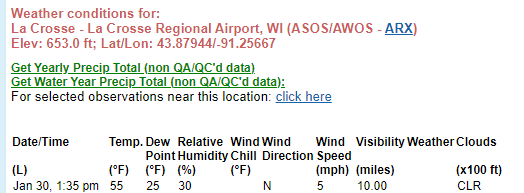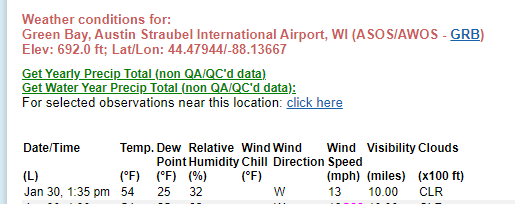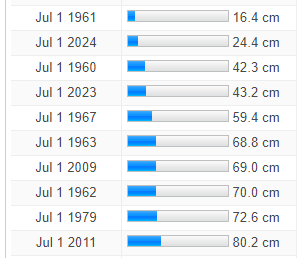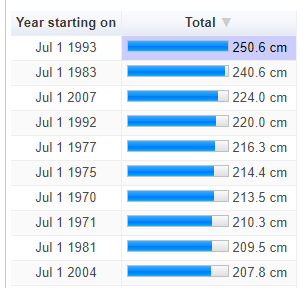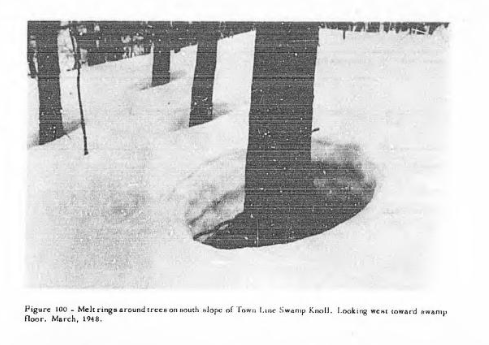
TheClimateChanger
Members-
Posts
4,231 -
Joined
-
Last visited
Content Type
Profiles
Blogs
Forums
American Weather
Media Demo
Store
Gallery
Everything posted by TheClimateChanger
-
Edit: Not sure what happened, but apparently the wrong values were showing when I first looked at it, maybe it didn't update or I clicked on the wrong location. The record at Madison is 58F from January 6, 1880, which I confirmed on ThreadEx. NowData looks correct when I checked again, so I'm not sure what I was looking at previously. Anyways, that one is probably safe, but still looking like a top 5-ish warmest January day at Madison, since 1869.
-
Temperatures continue to climb across the region, with locations such as Green Bay and La Crosse just a couple of degrees shy of all-time monthly record high temperatures. La Crosse, Wisconsin Green Bay, Wisconsin At Madison, the temperature has climbed to 54F. Allegedly, it reached 62F on January 26, 1944, but this seems dubious. The only other warmer January days at Madison were January 31, 1989 (56F), January 27, 2002 (55F) and January 24, 1981 (55F).
-
The site he links to can be expanded out to 1959-60. It gives this for the 10 least snowy winters, but the early data appears to be inaccurate. The value for 1961-62, in particular, appears implausibly low. The 10 snowiest winters are given below.
-
The all-time record for December at La Crosse is also quite recent, dating back to December 15, 2021, when the thermometer also reached 69F. So if the thermometer is able to crest this 57F hump, all three winter monthly record highs would have been set within the past 4 winters. It will certainly be a tall task, with the 57F record holding strong for an astounding 151 years, and only being able to be matched twice in that interval. To put this into perspective, the first time this record was set, it was less than 100 years from the American Revolution and only about a decade from the end of the U.S. Civil War!
-
As expected, the warmth has expanded over the Upper Midwest. As of shortly before noon local time, Madison and La Crosse were up to 50F, and Green Bay was at 46F, all of which are new daily records. The temperature at Rockford read 51F, one shy of the daily record. The all-time monthly record at La Crosse is 57F, set on January 1, 1897, January 3, 1874, and on January 25, 1981, which could be in jeopardy this afternoon. Of note, the all-time monthly record for February was set just last year, when the proverbial mercury reached a scorching 69F on February 27. Some would say that's a very nice number.
-
The winter of 1797-1798 must have pretty solid as well. Fine sleighing conditions, no doubt. The Tidewater Region probably had more snow in this 10-day stretch than they've had in the entire 21st century. Excerpt from "Why the Weather?" by Charles Frankin Brooks (1924). Some more details:
-
A couple others to look out for... forgot to check the NWS office in La Crosse, Wisconsin. La Crosse: 48F Forecast: 57F Rochester: 48F Forecast: 53F The forecast high of 57F at La Crosse would match the all-time January record.
-
Another round of near-record warmth is possible on Sunday, February 2nd, in some locations.
-
Widespread record-breaking warmth likely over the Upper Midwest tomorrow. The forecast high of 53F for GRB would obliterate the daily record by 11F, and come within 3F of the all-time January monthly record high. La Crosse, Wisconsin may reach 57F, which would match the all-time monthly high. Some records for 1/30 to keep an eye on, with forecast values in bold, for sites with long PORs: Minneapolis: 48F Forecast: 49F St. Cloud: 44F Forecast: 44F Eau Claire: 50F Forecast: 48F Madison: 47F Forecast: 54F Milwaukee: 53F Forecast: 54F Rockford: 52F Forecast: 54F Chicago: 55F Forecast: 53F Green Bay: 42F Forecast: 53F Wausau: 43F Forecast: 48F Rhinelander: 44F Forecast: 44F La Crosse: 48F Forecast: 57F Rochester: 48F Forecast: 53F
-
As shown by the map shared by @A-L-E-K, some of these forecast values may be overly conservative.
-
As noted elsewhere in this thread, MSP tied a record of 47F yesterday. Much more widespread record-breaking warmth is expected tomorrow in the Midwest. Some records to watch for 1/30, from long POR sites, with current forecasted values in bold. Minneapolis: 48F Forecast: 49F St. Cloud: 44F Forecast: 44F Eau Claire: 50F Forecast: 48F Madison: 47F Forecast: 54F Milwaukee: 53F Forecast: 54F Rockford: 52F Forecast: 54F Chicago: 55F Forecast: 53F Green Bay: 42F Forecast: 53F Wausau: 43F Forecast: 48F Rhinelander: 44F Forecast: 44F Most notably, at Green Bay, the forecast for tomorrow is a whopping 11F warmer than the daily record and just 3F shy of the January monthly record. Quite uncharacteristic for the home of Lambeau Field in January.
-
I took a deep dive on that winter. While definitely meager on the snowfall totals, the 9.9" figure is missing two snow events. An even deeper dive under the hood reveals the reason for the missing data. What is now the official "station thread" was then jumping around between what is now known as Quad Cities International Airport and the WB office in downtown Davenport, Iowa, as there were periods without observations at the airport. Looking at an old annual weather review for MLI, we can see that there was no snowfall observations in December, January and February at the airport, but portions of the station thread incorporate the airport data for the months of December and February, as there were temperature and precipitation observations. Unfortunately, this results in the missing snowstorm from early December 1936 (see earlier post), and also loss of snow that fell in an apparent rain-to-snow event in late February. Davenport WBO only had 2.5" and 1.3" in those events, but even that would place 1936-1937 out of futility. Judging by the observed temps and precipitation in the early December event, it would appear likely that the airport area had more snowfall in that event. The missing data could be rectified by simply using the city office observations for the entire month of December & February, but unfortunately that's not what the station thread does. The Davenport WBO records for January also inexplicably have a few dates on which snowdepth increased, even though no measurable snowfall fell. I can live with that - even if it is an anomaly/irregularity - but the missing data ought to be rectified. This was also the case in many of the early winter records, including that from the #2 lowest snow year (1901-1902). No missing data that winter though. But it was clearly miles better than this winter, with actually fairly deep snow cover (5-6") for an extended period of time, despite the reported seasonal snow being only 11.1 inches.
-
They have bumped it back up. Now saying near record warmth is likely. Thursday Partly cloudy in the morning, then mostly cloudy with a slight chance of rain showers late in the afternoon. Near record breaking warmth likely. Highs in the lower 50s. South winds 10 to 20 mph with gusts up to 30 mph. Chance of precipitation 20 percent.
-
-
Occasional Thoughts on Climate Change
TheClimateChanger replied to donsutherland1's topic in Climate Change
-
Probably not ready to pull the trigger on record/near-record warmth. I would imagine 50s in Chicagoland would be close to a record for January 30. Edit: Yes, looks like the record is 55F.
-
This is apparently a natural phenomenon. I was recently reading "Temperature Differences in Harvard Forest and their Significance" by Dr. Herbert A. Rasche, for the U.S. Army Environmental Protection Research Division (1958). Figure 100 in the report shows what are termed "melt rings" around the trees in Town Line Swamp Knoll in March 1948. Apparently, the dark trees must warm up and melt the snow around them.
-
That's crazy. And it's not even "fake" effect snow that's like mostly air and loses like half of its depth in 24 hours.
-
I'm inclined to agree with you on this point. I get told on certain subforums here that top 5/top 10 hottest months, seasons, years aren't that big of a deal. Forgive me for not finding a month where historically more than 1 in every 3 years were colder. And the historical rate was probably more like 1 in 2 before the recent warm period.
-
Wow, that's insane. How much snow is that? Looks like a winter of yore, but it's only 14 years ago.
-
New England Winter 2024-25 Bantering, Whining, and Sobbing Thread
TheClimateChanger replied to klw's topic in New England
Honestly, that might be the reason for the flag, not any equipment problem. It looks like the high and low were simply transposed on the 28th, but you can tell the observer was not properly resetting the instruments at a fixed time each day. Which unfortunately may have divested a legitimate state record, considering the Vermont state record was set on the same date. -
New England Winter 2024-25 Bantering, Whining, and Sobbing Thread
TheClimateChanger replied to klw's topic in New England
Probably not far off. Berlin was -41F and Pittsburg, New Hampshire was -44F on the same date. The mean temperature for the month at Pittsburg was 10.0F, just 0.7F warmer than the Dixville Notch observation. Bloomfield, Vermont reached -50F on the same date, which is the all-time record low for the State of Vermont. -
Fall/Winter '24 Banter and Complaints Go Here
TheClimateChanger replied to IWXwx's topic in Lakes/Ohio Valley
Caribou had 109 inches in the winter of 1966-67, where are you getting 36? Caribou has never had such little snow. -
Too bad January hath not 30 days.
-
Occasional Thoughts on Climate Change
TheClimateChanger replied to donsutherland1's topic in Climate Change
Can anyone explain this? I don't dispute the finding... that is, that climate-driven warming threatens agricultural productivity in Central Europe. My question is with these depictions of historical agroclimatic zones. If you just looked at this reconstruction, you would think the period 1501-1525 had similar regional temperatures to 2001-2018, and 1926-1950 was similar to 1601-1625, one of the coldest times of the Little Ice Age, and, bizarrely, even colder in the western parts of the region of interest. My problem is this... these reconstructions make zero sense based on hundreds of years of climatology. I realize there are regional variations, but I think it's implausible that this part of the world would have experienced similar agroclimatic zones to the recent past during a time when global temperatures were more than 1C cooler than the present. If we look at recent years, which have been as much as 1.5C of warming from the late 19th century, these periods were probably 2C or more cooler based on most reliable reconstructions. 1926-1950 was also a period of relative warmth globally on a millennial or multi-millennial timeframe, with some stability or even modest cooling in the ensuing decades, only for another large step-up in temperature to occur in the latter parts of the 20th century. More caution should be had when combining proxy data and instrumental records. I feel like if 1926-1950 and 2001-2018 were calculated in the same manner as the earlier periods, there should be a lot more oranges and reds in the earlier period, and the most recent should be blood red. Something is off here. Like I said, I don't dispute the finding AT ALL. However, to me, the graphic is casting a misleading view and literally flies in the face of hundreds of years of scientific understanding of the earth's climates - an understanding and knowledge that even predates the discovery of the greenhouse effect.

